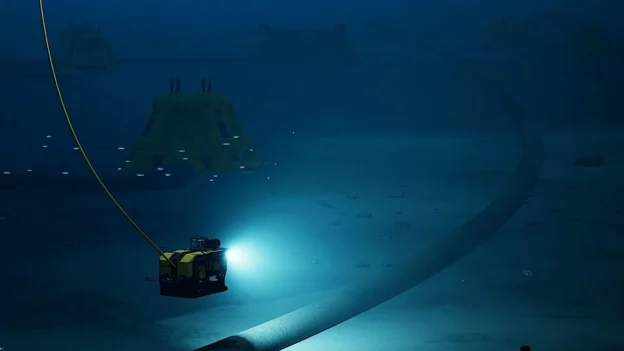A new alliance of TotalEnergies, Equinor, Aker BP, DeepOcean, Tenaris and LS Cable & System is developing FlowHeat, a heating technology for subsea flowlines that promises to improve efficiency in offshore projects and reduce emissions.
The solution aims to overcome thermal challenges in long-distance pipelines located in deep, low-temperature environments, where the risks of wax and hydrate formation impact the transportation of crude oil. FlowHeat allows power cables to be installed downstream of the pipeline or integrated into coiled tubing systems, significantly simplifying the process.
Less consumption, more range and lower emissions with FlowHeat
FlowHeat’s patented design offers less complex installation and a lighter weight structure, reducing the use of large vessels and allowing operation with ROVs more compact ROVs. This configuration contributes to a 30% reduction in carbon emissions emissions and up to 35% reduction in installation costs.
The technology is designed to operate over distances of up to 30 km, with the potential to extend to 50 km, and at depths of up to 3000 meters. In addition, the system is repairable and features real-time monitoring through fiber optics.
Specialized cooperation for real applications
Each company contributes a key role in the FlowHeat value chain: DeepOcean leads project management and engineering; Tenaris contributes with thermal coating solutions; LS Cable & System supplies subsea power and communication cables; while TotalEnergies, Equinor and Aker BP contribute operational expertise, infrastructure and investment capacity for validations.
The project is supported by the Norwegian Research Council for pilot testing under real conditions. Initial tests have already demonstrated reliable installation over rough terrain and high electrical efficiency.
International adoption perspective
The demand for efficient seabed heating efficient seabed heating technologies is growing. On the Norwegian Continental Shelf alone, multiple subsea connections are projected for the coming years. Globally, more than 300 potential projects that could benefit from systems such as FlowHeat have been identified in regions such as Brazil, the United States and West Africa.
The consortium aims to make FlowHeat a viable standard for new offshore developments, with efficiency, cost and sustainability benefits that could transform flow assurance in demanding environments.
Source and photo: Deepocean

